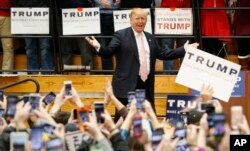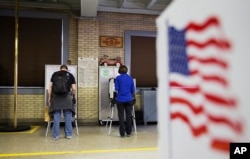When we step into the voting booth, we’re bringing Stone-Age brains to bear on 21st-century issues, author Rick Shenkman concludes in his new book, Political Animals.
And Shenkman said the mismatch between our Stone-Age brains and 21st-century reality has worked especially well for Republican front-runner Donald Trump.
"All of us like to think that we’re rational creatures,” Shenkman said. But after diving into research from evolutionary psychologists, neuroscientists, behavioral economists and more, Shenkman concludes, “when it comes to politics, we mostly go on instinct."
Those instincts served us well when we were highly social hunter-gatherers living in small groups of 100 to 150 people.
But the world has changed in countless ways, and in many situations, "nothing that we experienced back in the Pleistocene is comparable," he said. "So, our instinctive reactions tend to be off.”
Or, as the book’s subtitle puts it, our Stone-Age brains get in the way of smart politics.
As seen on TV
One way our Stone-Age brains fail us: As highly social creatures, we evolved brain circuits that read faces in a flash. But Shenkman says we put an undue amount of faith in the judgments we generate from very little information.
Researchers showed test subjects photographs of unfamiliar candidates and asked them to rate each one’s competence. Subjects saw the photos for just a fraction of a second. "At this speed, humans aren’t making a thoughtful judgment," he wrote. "They are simply reacting."
And yet, the candidate that subjects judged as more competent based on seeing just a flash of a photo was the one who won the election 70 percent of the time.
That kind of rapid-fire assessment might have been OK when we spent more time with our leaders and knew them intimately, Shenkman said. “Today,” however, “we just see people on TV. We instantly make judgments about who they are and what they're capable of and what their character is based on what we’re seeing. And yet, it’s extremely superficial.”
Voters have seen Donald Trump on TV for years. “Just because we see somebody on TV doesn't mean we know them,” Shenkman warns, “but our brains trick us into thinking we do.”
Emotional thinking
Two primal emotions -- anger and fear -- are riding high in the American electorate. Both get in the way of rational decisionmaking, Shenkman says. And both work in Trump’s favor.
Fear of outsiders was an asset to our ancestors, he noted. “Back in the Stone Age days, when you couldn’t trust people outside your community, that was an instinct that could very well save your life.”
Modern societies mostly ignore that instinct. But “at times where people feel vulnerable” -- as they do with a lackluster economy and the threat of terrorism -- “then that ancient evolved mechanism can be activated.” Trump is pushing that ancient fear button with his proposals to deport millions of people and ban Muslim immigrants, Shenkman said.
Anger is a common theme in this year’s election. “When people are angry, they become closed-minded,” he noted.
Shenkman points to a study in which subjects read a made-up news story about a controversial topic. They were offered links to read more about the topic. Those who were made angry by the story did not click the links. “They did not want to know more,” he said.
Brains in overdrive
And once people’s minds are made up, they’re remarkably hard to change, even when presented with facts. That may have worked for our ancestors, when our beliefs helped shape our group identity, Shenkman said. But it’s not good for rational decisionmaking.
In one eye-opening experiment, researchers put test subjects in a brain scanner and showed them clear evidence that their preferred candidate made hypocritical statements.
It made them uncomfortable. But it didn’t change their minds. In fact, he said, “Their brains immediately went into overdrive,” working hard to discount the new information and shut down the unpleasant emotions it triggered. When their minds expelled the offending facts, they were rewarded with a feel-good burst of serotonin.
What they did not do was make independent, rational assessments that could lead them to change their opinions. Unfortunately, “that’s the opposite of reason,” Shenkman noted. In a democracy, that’s a problem.
Voter revolution
The good news, he said, is that “if you become aware of all the different ways in which our brain tricks us, then you can at least recognize in yourself when you’re having an instinctive reaction,” and you can start to work against it.
In the same way that the consumer revolution of the 1960s and 70s raised awareness about how marketers work to trick us into buying things, “we now need a voter revolution,” he said, “so that we start second-guessing our basic, automatic responses to stimuli.”
One tip Shenkman offers for broader thinking: “If you find yourself in a tightly knit circle of like-minded people, get out and start talking to people with other ideas.” We have to fight our instinct to stick with our tribe.
It’s good advice, said psychology and political science professor Matt Motyl at the University of Illinois at Chicago. Motyl is studying how to take the acrimony out of controversial debates. But it’s still a work in progress, he said.
“Right now, I don’t think there’s much evidence to make any good claims about ways to overcome some of these Stone-Age mindsets,” he said.







